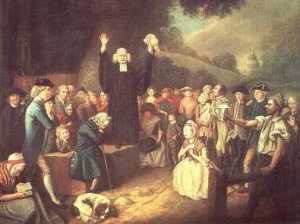 In my ongoing American history series, I’ve completed three posts on the First Great Awakening. They have highlighted the people whom God used to bring an awakening to colonial America. William and Gilbert Tennant established the Log College to train ministers; Jonathan Edwards was the theologian of God’s love best known for his sermon Sinners in the Hands of an Angry God; George Whitefield, an itinerant evangelist from Britain, pulled it all together with a series of trips to America, and was as popular in his day as another George—Washington—was later.
In my ongoing American history series, I’ve completed three posts on the First Great Awakening. They have highlighted the people whom God used to bring an awakening to colonial America. William and Gilbert Tennant established the Log College to train ministers; Jonathan Edwards was the theologian of God’s love best known for his sermon Sinners in the Hands of an Angry God; George Whitefield, an itinerant evangelist from Britain, pulled it all together with a series of trips to America, and was as popular in his day as another George—Washington—was later.
Some, though, have pointed to what they call the bad effects of the Awakening. They single out some individuals who went too far in their enthusiasm and acted strangely. They also decry the split that occurred in some denominations over the Awakening.
To those criticisms I reply: first, there will always be some who go too far, and no movement should be judged solely by their actions; second, Jesus said He came to split families along lines of those who believed Him and those who rejected Him. The split that occurred in some of those churches was sometimes merely a difference of opinion in tactics for preaching the Gospel. Others who objected were beginning to edge toward Unitarianism, which is a denial of Jesus as divine. Therefore, I don’t put much stock in the negative results of churches splitting over the Awakening.
What did it accomplish? I see three definite, positive developments.
- First, it re-emphasized the personal nature of salvation. Each person is responsible for his/her response to God’s offer of mercy. No one gets into His kingdom by going through all the external motions: baptism, communion, church attendance. Neither is salvation a “group” thing; each one of us must give an account of our lives individually.
- Second, it started a round of college planting for the purpose of raising up even more ministers (and those who chose other professions) grounded in a Biblical way of thinking. Colleges started during that time included what we now call Princeton, Dartmouth, and Brown. Note that they all began as Christian colleges. How the great have fallen.
- Third, this Awakening created a common experience for all colonial Americans from Georgia to Massachusetts. Prior to this event, each colony saw itself as a separate entity with more connection to London than to each other. The spiritual experience of the Awakening also awakened them to their common interests, thereby helping to create greater unity of thought and purpose—something they would need as the crisis of the American Revolution approached.
In my view, this First Great Awakening was a genuine move of God to shake the people from their spiritual lethargy and stupor. It accomplished its purpose.
